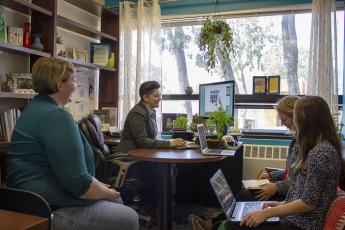Professor leads effort to meet mental health needs for local LGBTQ+ community

Cal Poly psychology Professor Jay Bettergarcia and the QCARES program have received a $519,700 grant to support the SLO ACCEPTance Project, a mental health training program in San Luis Obispo County that aims to address a long-identified need for mental health services for local lesbian, gay, bisexual, transgender, queer and questioning (LGBTQ+) community members.
Through a nine-month intensive program, the SLO ACCEPTance (Affirming Cultural Competence Education and Provider Training) Project will train mental health professionals to provide affirming services for the local LGBTQ+ community. The project will be funded for four years by San Luis Obispo County’s Mental Health Services Act.
“San Luis Obispo County lacks well-trained affirming therapists, especially for transgender and gender non-binary clients, and many LGBTQ+ community members travel outside of the county to find support,” said Bettergarcia, the principal investigator on the project. “As a semi-rural county, more is needed to build the infrastructure of well-trained professionals that can meet the mental health and wellness needs of the LGBTQ+ community in San Luis Obispo.”
The project is designed to address the dire need for increased access to culturally and linguistically competent mental health services for the LGBTQ+ community in San Luis Obispo County. Through academically informed and comprehensive training, it will create a network of approximately 50 mental health professionals from various geographic areas and various agencies — including schools and private practices — who are equipped to serve LGBTQ+ clients, including both master- and doctoral-level therapists.
The SLO ACCEPTance project is a collaboration involving Bettergarcia and expert researchers, therapists and trainers across California, including Theodore Burnes, Ph.D., director of training and education programs at the Los Angeles Gender Center; Ben Guilhufe, director of community-based clinical programs at the UCSF Child and Adolescent Gender Center; KJ Conover, Ph.D., assistant professor of clinical psychology at Alliant International University in Los Angeles; and Emmie Matsuno, M.A., vice president of Santa Barbara Transgender Advocacy Network. The team also includes Cal Poly master of public policy student Elissa Feld as project coordinator, recent Cal Poly graduates Emma Wedell and Amanda Shrewsbury as QCARES lab managers, and several Cal Poly student researcher assistants.
The project draws upon decades worth of quantitative and qualitative research highlighting the underserved mental health care needs of the LGBTQ+ community and the dearth of providers with knowledge, awareness and skills to provide LGBTQ-affirming services in San Luis Obispo County.
In 2003, a Growing Together Initiative survey of the LGBTQ+ community in San Luis Obispo County found that some of the barriers to seeking mental health care services included fear of being mistreated by local providers and an insufficient number of services. Approximately a decade later, LGBTQ+ community members identified supportive mental health services and youth services as two of the most important service needs in the county. Most recently, both the 2014 California Healthy Kids Survey and the 2019 QCARES Mental Health Needs Assessment found that 49% of LGBTQ+ youth living in San Luis Obispo County reported having seriously considered attempting suicide in the past 12 months.
Increasing the number of well-trained therapists, school counselors and peers who can provide culturally competent care to LGBTQ+ individuals could help improve LGBTQ client access to services, clinical outcomes, and help create change for San Luis Obispo County, Bettergarcia said. Ultimately, the goal of the SLO ACCEPTance Project is for LGBTQ community members to feel more comfortable seeking mental health services, especially those who are low-income or without health insurance.




